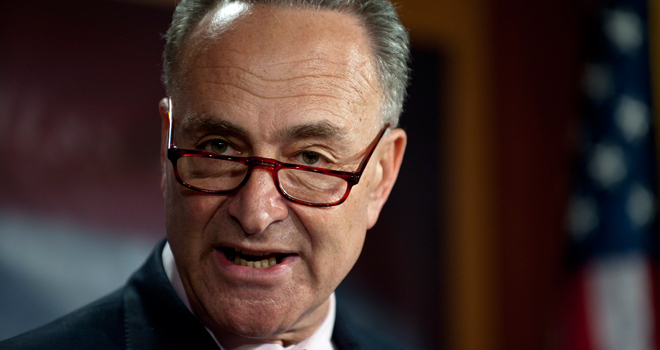By Reid Pillifant
| Capital New York
In 2006, by which time George W. Bush was extremely unpopular, Chuck Schumer guided six Democratic Senate candidates to victory over Republican incumbents as his party took control of the Senate. Now his party has to defend them.
“Obviously the advantage we had in 2006 is that there was an anti-Bush climate, and obviously that’s gone,” said Chuck Schumer, who led his party’s campaign efforts in 2006 and 2008 as head of the Democratic Senatorial Campaign Committee, in a phone interview. “On the other hand, these incumbents had a rough time getting known. Now they’re known. That’s an advantage. Because they’re good, they’re such quality people. So that sort of countervails it.”
He offered the following prediction: “I think every one of our incumbents is going to win.”
Among the six who beat Republican incumbents in 2006–Bob Casey in Pennsylvania, Claire McCaskill in Missouri, Jon Tester in Montana, Sherrod Brown in Ohio, Sheldon Whitehouse in Rhode Island, and Jim Webb in Virginia–Webb has declined to seek re-election in Virginia, and two others (Casey and Whitehouse) are likely to coast to victory.Â
Still, it’s a defensive effort this time, both because there’s a Democrat in the White House and because, thanks to their big gains six years ago, the Democrats, who hold a 53-47 majority in the Senate, have a lot more turf to protect now. (Twenty-three of the 33 seats that are up for election this year are currently held by Democrats.) And while Schumer helped stake the Class of ’06 to a big fund-raising advantage that cycle, the Supreme Court’s recent, super-PAC-enabling Citizens United decision has made Democratic senators the target of a campaign by Republican-allied groups that will involve as much as $100 million in ads.
The ripest targets for the Republicans are the Democrats running in states that are inhospitable to Barack Obama’s campaign.
“We’re paying attention to all the races, but we have to pay special attention in places like Missouri and Montana and Nebraska and North Dakota, where there won’t be much overlap,” Schumer said.
In Missouri, the top of the ticket is at least relatively close, with Mitt Romney leading Obama 48-45 in an April Rasmussen poll, making it likely that the president’s campaign will spend money there.
In the other states Schumer named, each of which has a Democratic senator up for re-election this year, it’s not much of a contest: in Montana, Romney leads 49 to 40; in Nebraska it’s 51 to 39; in North Dakota, 51 to 32.
Nebraska and North Dakota are made that much tougher propositions by a wave of Democratic retirements this cycle that included both states’ incumbents. Schumer put an optimistic face on those developments, calling it a “pleasant surprise” that Democrats recruited North Dakota’s popular attorney general, Heidi Heitkamp, and the former Nebraska governor, Bob Kerrey to run for the open seats.
It’s entirely possible that those candidates will outperform Obama significantly. North Dakota hasn’t voted for a Democratic presidential candidate since 1964, but the state re-elected the retiring incumbent, Democrat Kent Conrad, for 25 years. And a recent poll, commissioned by the state Democratic Party, that showed North Dakotans overwhelmingly dissatisfied with the country’s direction showed Heitkamp leading her Republican challenger 49 to 44, despite Romney leading Obama 51 to 32.
In Montana, the state’s Democratic governor recently wrote off the president’s chances there–in part due to the president’s ambivalence about the Keystone Pipeline–but nonetheless predicted the re-election of Senator Jon Tester, the seven-fingered organic farmer who brings Montana beef back with him to Washington, and who was one of the biggest Democratic surprises when he won in 2006.
“Each of them has their own brand, and they are identified with their state,” Schumer said. “Tester is Montana. That’s not his slogan but you could almost use it as one. And that’s not much different than Heitkamp or Kerrey or [Missouri Senator Claire] McCaskill, for instance.” (Tester’s campaign released an ad last week called “Montana Beef – Montana Proud,” that shows him transporting local beef to Washington and says he’s “making the U.S. Senate look a little more like Montana.”)
The Republican response to “Tester is Montana,” of course, would be “Tester is Obama”: They and the independent groups are essentially fusing the president to each and every one of these red-state Democratic incumbents, and have taken to running down Heitkamp in particular for a having once said that Obama would be “amazing.”
In West Virginia, Senator Joe Manchin, a Democrat who won a special election in 2010 and his up for election this year to his first full term, recently said he isn’t sure who he’s going to support for president.
“Look each of these people is a very seasoned politician, in the positive sense of the word, and they’re going to do what they feel is appropriate,” Schumer said. “And, you know, I’d encourage them to do that.”
Schumer is careful to stress in conversations with reporters that he isn’t leading the efforts this year–he relinquished the DSCC chairmanship to New Jersey’s Robert Menendez before the 2010 cycle, and it now belongs to Patty Murray of Washington–but he concedes that he’s constantly on the phone trying to help the cause.
“My role is I’ve been helping them all raise money, I’ve been giving them advice, and I’ve been telling Patty Murray to ‘let me know whatever you need me to do,'” he said.
He said it’s slightly more difficult to raise the big donations when you’re competing with a presidential campaign, but that the internet helps. So far, the marginal members of the Class of ’06 seem to doing reasonably well.
Tester has raised nearly $6 million and has more than $4 million on hand.
In Missouri, McCaskill has more than $6 million on hand, as does Ohio Senator Sherrod Brown, who is facing a potentially difficult race against the 34-year-old state treasurer, Josh Mandel.
“I’m trying to be as helpful as I can because I feel a real bond with these people,” he said. “We became good friends through the races, and the friendship has deepened in the 6 years. And I admire them so, as people and as senators. So I want them to win, and I’m spending a good amount of time trying to help them.”
Schumer also thinks the Democrats can take some heat off the most vulnerable red-state Democrats by playing aggressively in some Democrat-friendly, Republican-held territory, like Nevada, Massachusetts and Maine, where the surprise retirement of Olympia Snowe opened the door for a Democratic gain. And he is hoping the party can follow up on the aggressive, unsuccessful, push he made in 2006 to unseat Jon Kyl in Arizona, who won with 53 percent of the vote that year, but has since announced his retirement.
Schumer thinks things could be different this year, with Democrats drafting a Latino candidate, former surgeon general Richard Carmona.
“The big change in Arizona is, you know, the Hispanic community is well aware of the sort of anti-immigration, strongly virulent and oftentimes nasty anti-immigration attitude of just about every Republican candidate,” Schumer said. Â
Nationally, the DSCC has outraised its counterpart, the Republican Senatorial Campaign Committee, $59 million to $56 million. (A big part of the organization’s pitch is that Democrats aren’t just playing defense, but actually have a chance to pick up seats in places like Arizona and Maine.)
But Schumer hasn’t yet succeeded in convincing the most deep-pocketed Democratic donors to invest at the same level as wealthy Republicans. While the Senate-targeted Republican-allied super PAC has raised $17 million with an ultimate goal of $100, through the end of March, its Democratic counterpart, called Majority PAC, had raised a little less than $3 million, with about $2.5 million in cash on hand.
“Obviously, we’re disappointed that on the Democratic side that our big wealthy givers, they don’t seem to be involved in helping super PACs,” said Schumer.
He declined to speculated about why the donors were reluctant. He just said that they were.
“It is true the Republican givers march in lockstep and have these huge things, and the Democratic givers each seems to go off in his or her own direction,” Schumer said.
Schumer says he hopes the wealth disparity won’t actually make things quite that uneven in practice. He contends that the super PAC’s ads tend to be of a lower quality than the slicker spots produced by the campaigns, and also noted that their dollars don’t go quite as far–unlike campaign committees, outside groups aren’t legally entitled to the lowest advertising rates. Meaning that as the demand for airtime creeps up closer to Election Day, super PACs will be forced pay three to four times the cost for the same airtime.
Still, they’ll have more than enough money to make things tough. The question is whether the reputations the incumbents have earned since getting into office can overcome the president’s unpopularity in some parts of the country, and the coming, inevitable onslaught of attack ads. That’s the proposition Schumer and the Democrats are counting on.
“In intense races in the Senate, the voters get a glimpse of the soul of each person running, who they are, what makes them tick,” Schumer said. “And I think we have a major advantage in our tough races in that. You take again the three or four toughest seats, and when they see a Tester, when they see a McCaskill, they see a Brown, a Bill Nelson, compared to who their opponent is, it’s going to make a big difference, and help us, even when the trend might be negative.”
Capital New York is a website about how New York City works, featuring news, analysis and investigations on politics, media, culture and sports. For more, visit http://www.capitalnewyork.com/. (c) 2012 Capital New York.











